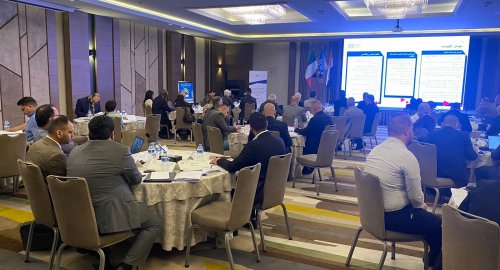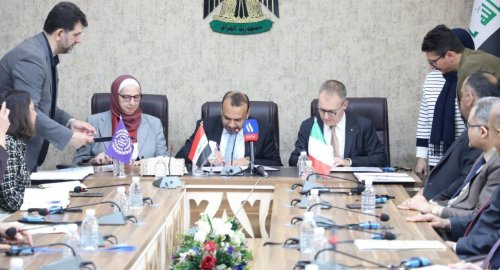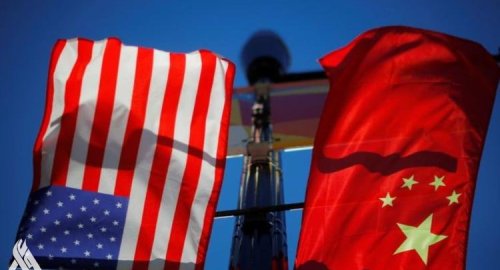
ILO says Iraqi government programmes helped transition to formal economy

- 16-10-2024, 17:43
Baghdad-INA
The International Labor Organization confirmed, on Wednesday, that the current government has developed programs and policies that help facilitate the transition to the formal economy while indicating that informal work represents a crucial component despite its problem in economic activity.
The International Labor Organization's country coordinator, Maha Qattaa, said at the national conference on informal work and paths towards decent work in Iraq, which was attended by the correspondent of the Iraqi News Agency (INA): that "This conference addresses a very important and urgent issue, which is the issue of the informal economy and informal work," noting that "the informal economy refers to the group of economic activities carried out by workers and economic units that are not covered either by law or in practice by formal arrangements or may be covered sufficiently."
“Informal or irregular work is a complex, multifaceted phenomenon that includes a variety of activities, transactions and individuals who work outside formal businesses but sometimes also work within formal businesses,” she added, noting that “informal work represents a crucial but somewhat problematic component of economic activity while the informal sector can be a mechanism for addressing and alleviating poverty.”
She explained that "most of the poor work in the informal sector, so we should not look at this sector as fair, but also as a sector that absorbs the poor and attracts individuals with low skills and low educational attainment. Therefore, the issue of looking at this sector is very important because it absorbs this number of workers."
Qattaa explained that "the problem lies in crises and shocks when they occur in any country, including the recent crisis with Corona. Those who were affected more than the workers were the workers in the informal sector because there was no mechanism to reach these workers. On the contrary, the workers who work in the organized sector have records that show where these workers are located."
She continued: “It was difficult to provide some services to workers in the informal sector, so we sometimes call them invisible workers, because it is really difficult to reach them, in addition to companies and institutions that operate in an informal manner, even in crises, there is a difficulty in how to reach these companies to help them in most countries, and during the Corona crisis, aid packages were provided to companies, but we did not reach companies and institutions if they were not regular.”
She pointed out that "informal work is not limited to Iraq, it exists all over the world, but the percentage of informal work or informal economy varies from one country to another," indicating that "the International Labor Organization adopted in 2015 a recommendation called the recommendation for the transition from the informal economy to the formal economy, and recommendation number 204 approved guiding policies for all countries that wish to complete the transition process to help them in this process."
She stated that "small, medium and large companies play a role in creating job opportunities in the construction, services and manufacturing sectors, which create job opportunities in Iraq," explaining that "women work more in the informal sector in most countries of the world, while in our Arab region, men work more in the informal sector for several reasons, the most important of which is that women in our Arab region and also in Iraq prefer to work either in the public sector or in the organized private sector, as job opportunities in the informal sector do not attract women. This issue is attributed to the advantages offered by the informal private sector, because it is an unprotected sector that does not provide decent job opportunities or social security. There is no protection for workers, so women are reluctant to enter the labor market, especially in the sectors."
“We commend the current government for taking major measures and procedures to facilitate the transition through new legislation, including the Social Security Law and the amendment of the Labor Law in 2015, all of which helped move forward with the transition process,” she added, “There are current material policies, plans and programs being implemented by the government, including the recently launched National Development Plan, work to update the private sector development strategy, the policy of regulating small projects and developing small and medium enterprises, and others. All of these programs and policies will also help facilitate the transition process.”
China Says It 'Firmly Opposes' US Military Aid To Taiwan
- International
- 07:36
First joint picture of Greenland Ice Sheet melting, ESA
- Multimedia
- 09:28
US Central Command: We killed ISIS terrorist leader Abu Yusuf in Syria
- International
- 24/12/20
Liverpool compete with Real Madrid to sign Olympique Lyonnais star
- Security
- 24/12/19
ISC, ADX discuss Strengthening Economic Ties
- Economy
- 24/12/16
Iraq assumes presidency of Arab Investment Company’s Executive Board
- Economy
- 24/12/17












